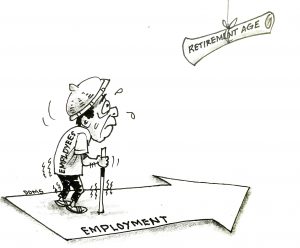The retirement age is a topic of great significance, particularly in nations grappling with changing workforce dynamics. One case in point is the retirement age in our country—it should be made earlier. By considering the implications of an earlier retirement age on the economy, labor market, and societal aspects, this proposal will shed light on the potential benefits of such a policy change.
Economic considerations provide a strong rationale for lowering the retirement age in the Philippines. With a lower retirement age, there will be more job vacancies available for younger Filipinos seeking employment opportunities. This would stimulate the entry of fresh talent into the labor market, leading to increased productivity, innovation, and growth. Additionally, an earlier retirement age could encourage more individuals to participate in income-generating activities beyond traditional retirement, fostering entrepreneurship and enabling the elderly to contribute to economic development and reduce their dependence on social welfare programs.
Moreover, an earlier retirement age can alleviate concerns related to the sustainability of social security systems. As life expectancies continue to increase, individuals often outlive their retirement savings and rely heavily on pension programs. By lowering the retirement age, individuals can be assured of receiving social security benefits earlier, allowing them more time to enjoy these benefits while reducing the strain on the pension system. An earlier retirement age offers opportunities for retirees to spend quality time with their families, pursue personal interests, contribute to community service, and engage in overall personal growth and fulfillment.
A lower retirement age can also address the physical and mental health challenges faced by employees approaching the current retirement age in the Philippines. Many workers endure high stress levels and physical strain as they continue working until they reach their late 60s. An early retirement option would provide older workers with the opportunity to leave the workforce before their health deteriorates significantly, reducing the risk of work-related health issues and improving overall well-being. This policy change would enable individuals to retire at a time when they can still actively engage in recreational activities, maintain social connections, and enjoy their retirement years instead of feeling burdened or burnt out.
Indeed, lower retirement age has several significant advantages. A thoughtful policy change, taking into account the unique needs and circumstances of our society, can lead to a more equitable and sustainable retirement system while fostering personal growth and quality of life for the elderly population.




